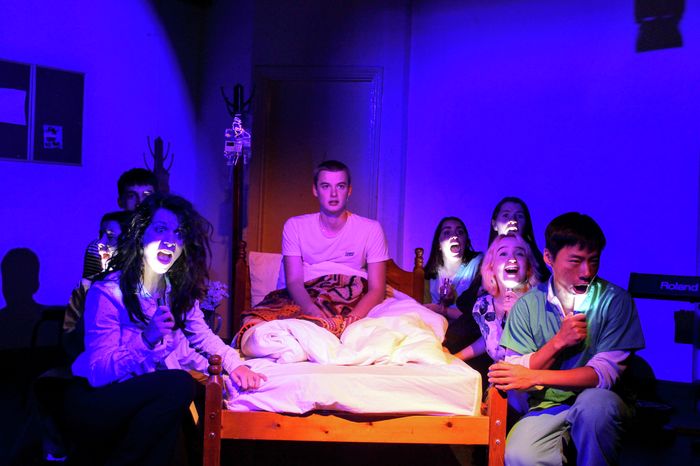Wuthering Heights: ‘the restraints and repressions that plague this epic love beg to be considered in a different light’
Emerging from the shadows of the moors, this reimagining of Cathy and Heathcliff’s romance as one of queer love reached new, unexplored, heights.

An adaptation of Wuthering Heights with a ‘modern edge’ is every English student’s worst nightmare. Nobody should tamper with Emily Brontë’s genius, and not many people in Cambridge theatre have dared. James Critchley took the plunge this term, and tamper with it he certainly did.
While to strictly measure this production against the novel would be to miss the impact it can have, the production would, at times, certainly make Brontë turn in her grave. Critchley claimed this production is ‘heretical for Emily Brontë purists,’ however, the decision to refigure Heathcliff (Kitty Ford) as a woman did mean the production was given a shape of its own; incomparable to that of the novel itself. Emerging from the shadows of the moors, this reimagining of Cathy (Sarah Mulgrew) and Heathcliff’s romance as one of queer love reached new, unexplored, heights.
This queer reimagining meant that major sources of conflict between Cathy and Heathcliff in the novel are informed by socio-economic issues and ones of sexuality too. Heathcliff’s claim that she ‘can’t give [Cathy] what [Linton] can’ becomes one imbued with sexual complications, in addition to those of Heathcliff’s social standing. The restraints and repressions that plague this epic love beg to be considered in a different light.
Likewise, Cathy’s assertion that if she was ‘to forget’ Heathcliff she would ‘have to forget [herself]’ is riddled with queer complications. Cathy describes Heathcliff as ‘her soul’, and, in Critchley's production, her soul is now one challenged by heteronormative expectations.
Kitty Ford's Heathcliff was appropriately animalistic and passionately portrayed; the shift of her relationship with Sarah Mulgrew’s Cathy from one of naive love to an intense and dark inseparability was effortless. The performance that has to be most highly commended was, however, Mark Jones’s portrayal of Edgar. It was arresting, it was hilarious, and it was brilliant to watch.
The production seeks to impose a ‘modern edge’ on Brontë’s classic tale. Critchley claims the production sets the relationship against a ‘heteronormative social landscape that endeavours to contain difference’ and ‘assert a narrowly-defined sense of order.’ But, while this ‘heteronormative social landscape’ is undeniably inferred by the novel’s Victorian contexts, it’s never quite fully explored in the play’s modern scene.
Although the lack of an overt acknowledgement concerning the changing of Heathcliff’s gender in the play makes this transition seamless, it meant that, at times, areas of potentially rich exploration were left unfulfilled. For example, Heathcliff and Hindley’s dynamic as one which is between a man and a woman, and as one where Heathcliff eventually owns and controls Hindley’s property, radically changes its impact. Yet, this being left unacknowledged meant the changing of Heathcliff’s gender, because it was so stunningly original, felt like it needed to be platformed in a production in and of itself.
For Critchley, theatre should, however, ‘never provide the answers, only ever ask questions,’ and his production certainly does. Cathy and Heathcliff’s love in this production becomes revelatory; it changes the way one will subsequently consider this all-consuming relationship at its centre and Wuthering Heights as a whole.
Wuthering Heights is showing at 7:45pm from Tue 11th – Sat 15th October 2022 in the ADC Theatre
 Features / Should I stay or should I go? Cambridge students and alumni reflect on how their memories stay with them15 December 2025
Features / Should I stay or should I go? Cambridge students and alumni reflect on how their memories stay with them15 December 2025 News / SU reluctantly registers controversial women’s soc18 December 2025
News / SU reluctantly registers controversial women’s soc18 December 2025 News / Dons warn PM about Vet School closure16 December 2025
News / Dons warn PM about Vet School closure16 December 2025 News / Cambridge study finds students learn better with notes than AI13 December 2025
News / Cambridge study finds students learn better with notes than AI13 December 2025 Arts / A beginner’s guide to Ancient Greek tragedy16 December 2025
Arts / A beginner’s guide to Ancient Greek tragedy16 December 2025










